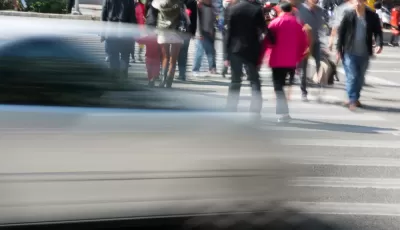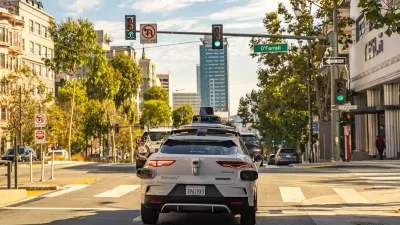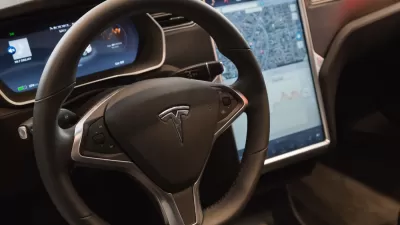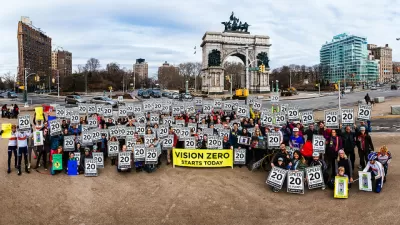With cars accelerating more quickly, drivers have less time to react and can pose more danger to pedestrians.

Car companies boast about the rapid acceleration of their vehicles. Tesla and electric rivals Rivian, Porsche, and Audi claim their vehicles can hit 60 miles per hour in two seconds. Writing in Bloomberg CityLab, Dan Albert asks, what does this mean for road safety?
Albert provides an illuminating history of the drive for acceleration and power in the car industry. While the muscle car is the quintessential example of that impulse, “EVs possess a big technical advantage over their gas-powered kin when it comes to acceleration.” As Albert explains, “Electric motors can generate all of their power from zero RPM, giving EVs their eye-popping acceleration figures, particularly at the lower end of the speedometer.”
The article goes on to explain why this poses a danger to pedestrians, particularly in urban areas. Albert acknowledges that “The degree to which extreme acceleration could be contributing to the surge in traffic deaths the US has been experiencing in recent years isn’t known; a slew of factors, including the growing popularity of oversized SUVs and pickup trucks, have combined to make American roadways disproportionately lethal, and the dangers that larger vehicles pose is dramatically magnified by speed.” But faster acceleration gives drivers a smaller margin of error, making it harder for a driver to react before a crash. “Safety experts have only begun to consider what this new generation of high-powered vehicles means for the passenger alighting from the bus or the pedestrian scurrying across the road.” While the auto industry is likely to resist regulation, technology such as geofencing that reduces vehicle speeds in certain zones can limit the negative impact of faster acceleration.
FULL STORY: Extreme Acceleration Is the New Traffic Safety Frontier

Alabama: Trump Terminates Settlements for Black Communities Harmed By Raw Sewage
Trump deemed the landmark civil rights agreement “illegal DEI and environmental justice policy.”

Study: Maui’s Plan to Convert Vacation Rentals to Long-Term Housing Could Cause Nearly $1 Billion Economic Loss
The plan would reduce visitor accommodation by 25% resulting in 1,900 jobs lost.

Planetizen Federal Action Tracker
A weekly monitor of how Trump’s orders and actions are impacting planners and planning in America.

Study Links Covid and Poor Driving
The effects of the virus, including ‘brain fog,’ can make driving more difficult and dangerous.

Waymo Gets Permission to Map SF’s Market Street
If allowed to operate on the traffic-restricted street, Waymo’s autonomous taxis would have a leg up over ride-hailing competitors — and counter the city’s efforts to grow bike and pedestrian on the thoroughfare.

Parklet Symposium Highlights the Success of Shared Spaces
Parklets got a boost during the Covid-19 pandemic, when the concept was translated to outdoor dining programs that offered restaurants a lifeline during the shutdown.
Urban Design for Planners 1: Software Tools
This six-course series explores essential urban design concepts using open source software and equips planners with the tools they need to participate fully in the urban design process.
Planning for Universal Design
Learn the tools for implementing Universal Design in planning regulations.
Caltrans
Smith Gee Studio
Institute for Housing and Urban Development Studies (IHS)
City of Grandview
Harvard GSD Executive Education
Toledo-Lucas County Plan Commissions
Salt Lake City
NYU Wagner Graduate School of Public Service





























